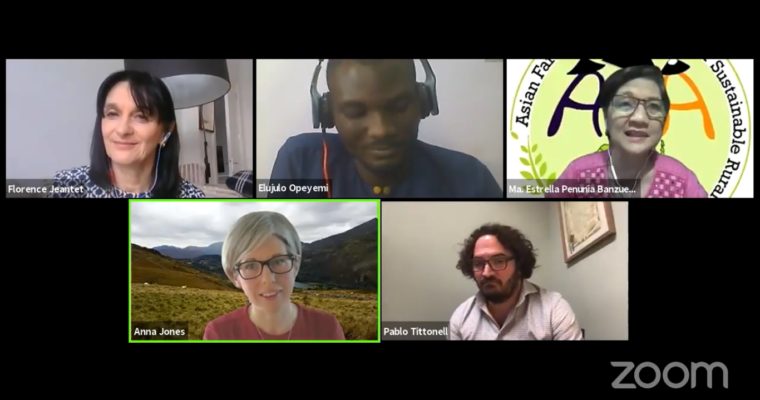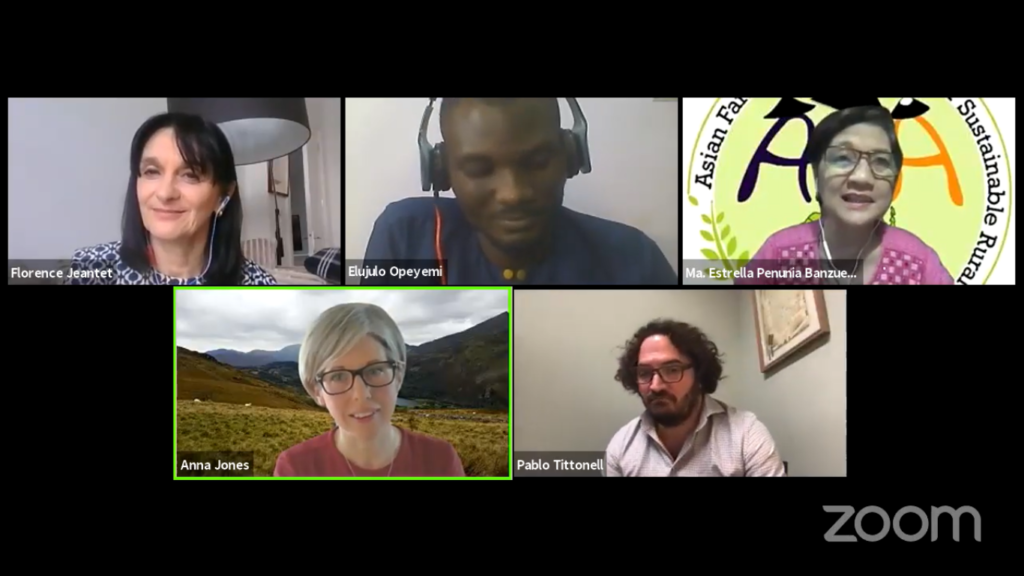In a world where 2/5 of the world’s plants and a million species now face extinction, where we lose rainforests the size of a football field every minute, and where agriculture is causing 80% of ecosystem degradation, contributing to climate change and biodiversity loss and degraded soils, can we cultivate a common ground between agriculture and conservation, and unite farmers and environmentalists?
This is the topic of the high-level event titled “Cultivating the common ground for agriculture and Conservation” organized by the International Union for Conservation of Nature (IUCN), held last November 19, 2020, through Zoom and live-streamed through YouTube.
Esther Penunia, Secretary-General of the Asian Farmers’ Association for Sustainable Rural Development (AFA), joined the event to represent farmers. Event panelists also included Pablo Tittonell (Argentina’s National Council for Science and Technology), Florence Jeantet (One Planet Business for Biodiversity), and Elujulo Opeyemi (Youth for the Environment, Nigeria), representing the academic, business, and youth and grassroots sector respectively.
In her intervention, Ms. Penunia confirms that adopting sustainable, agroecological approaches is a very high priority among member family farmers of AFA, especially when they see the interconnections between taking care of the environment and increased yields and increased incomes. “But awareness will not be enough to shift. There must be support to sustainable fishing, farming, forestry, in terms of the incentives, in terms of capacity building, in terms of technologies, information, support on prices, even awards to farmers. These are all important for farmers to stick to sustainable agriculture .”
But there are barriers to uniting agriculture and conservation. Ms. Penunia has identified four barriers, including the current paradigm of modern chemical-intensive, industrialized agriculture that puts priority at the expense of the environment; the absence or lack or conflicting policies especially at the national level on the kind of agriculture to be supported; the absence or lack of support to agriculture that does conservation and the low regard for farmers as key agents and solution provider.
“We are calling for a transformation in our food systems, and the transformation is basically in making family farmers through their organizations be recognized as key agents. And then in production, in processing and in marketing, that family farmers through their organizations, are involved as key participants, also in the governance processes, Ms. Penunia added.
Anna Jones, a journalist, and moderator of the event, concluded that in this panel, we “agree that farming and the environment are inextricably linked, they are intertwined, in a relationship that has been for 10,000 years, but it’s only in the last 50 years or so the adversarial narrative has emerged. But a new era has begun. Regenerative agriculture, conservation farming, nature-based solutions, agroecology, zero budget natural farming, are bringing two mighty forces together: nature and her resilient capacity to bounce back, and our learning as humans, taking the best of what we have discovered about growing food and perhaps having the courage to discard the stuff that has not worked out quite so well in the long run. Conventional, organic farmers, environmentalists, scientists, business, governments, NGOs, and consumers, we can all play our part in that. We may need to shift our positions a little bit, we may need to open our minds slightly, but when we do, the reward is meeting each other on that fertile, biodiverse, carbon-packed, earthworm-loaded common ground.”
The full dialogue is accessible here.
The IUCN news story about the event is here.
-END-





Comments are closed